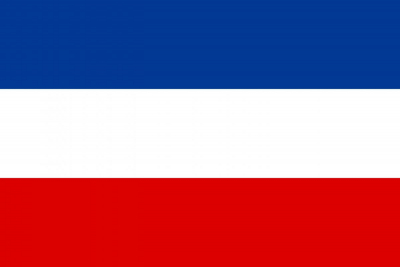The Treaty of Rapallo was a treaty between the Kingdom of Italy and the Kingdom of Serbs, Croats and Slovenes (renamed Yugoslavia in 1929) that was signed to solve the dispute over some territories in the former Austrian Littoral, which was in the northern Adriatic, as well as in Dalmatia.
The treaty was signed on 12 November 1920 in Rapallo, near Genoa, Italy. The signing was preceded by Italo-Yugoslavian negotiations at Villa Spinola, which were led notably by Ivanoe Bonomi and Francesco Salata.
The Kingdom of Yugoslavia (Serbo-Croatian: Kraljevina Jugoslavija / Краљевина Југославија; Slovene: Kraljevina Jugoslavija) was a state in Southeast and Central Europe that existed from 1918 until 1941. From 1918 to 1929, it was officially called the Kingdom of Serbs, Croats and Slovenes (Serbo-Croatian: Kraljevina Srba, Hrvata i Slovenaca / Краљевина Срба, Хрвата и Словенаца; Slovene: Kraljevina Srbov, Hrvatov in Slovencev), but the term "Yugoslavia" (literally "Land of South Slavs") was its colloquial name due to its origins. The official name of the state was changed to "Kingdom of Yugoslavia" by King Alexander I on 3 October 1929.The preliminary kingdom was formed in 1918 by the merger of the provisional State of Slovenes, Croats and Serbs (itself formed from territories of the former Austria-Hungary, encompassing today's Bosnia and Herzegovina and most of today's Croatia and Slovenia) and Banat, Bačka and Baranja (that had been part of the Kingdom of Hungary within Austria-Hungary) with the formerly independent Kingdom of Serbia. In the same year, the Kingdom of Montenegro also proclaimed its unification with Serbia, whereas the regions of Kosovo and Vardar Macedonia had become parts of Serbia prior to the unification.The state was ruled by the Serbian dynasty of Karađorđević, which previously ruled the Kingdom of Serbia under Peter I from 1903 (after the May Coup) onward. Peter I became the first king of Yugoslavia until his death in 1921. He was succeeded by his son Alexander I, who had been regent for his father. He was known as "Alexander the Unifier" and he renamed the kingdom "Yugoslavia" in 1929. He was assassinated in Marseille by Vlado Chernozemski, a member of the Internal Macedonian Revolutionary Organization (IMRO), during his visit to France in 1934. The crown passed to his 11-year-old son Peter. Alexander's cousin Paul ruled as Prince regent until 1941, when Peter II came of age. The royal family flew to London the same year, prior to the country being invaded by the Axis powers.
In April 1941, the country was occupied and partitioned by the Axis powers. A royal government-in-exile, recognized by the United Kingdom and, later, by all the Allies, was established in London. In 1944, after pressure from the British Prime Minister Winston Churchill, the King recognized the government of Democratic Federal Yugoslavia as the legitimate government. This was established on 2 November following the signing of the Treaty of Vis by Ivan Šubašić (on behalf of the Kingdom) and Josip Broz Tito (on behalf of the Yugoslav Partisans).

1920Nov, 12
Italy and the Kingdom of Serbs, Croats and Slovenes sign the Treaty of Rapallo.
Choose Another Date
Events on 1920
- 19Jan
League of Nations
The United States Senate votes against joining the League of Nations. - 8Mar
Arab
The Arab Kingdom of Syria, the first modern Arab state to come into existence, is established. - 19Mar
Treaty of Versailles
The United States Senate rejects the Treaty of Versailles for the second time (the first time was on November 19, 1919). - 28Apr
Soviet Union
Azerbaijan is added to the Soviet Union. - 25Oct
Sinn Féin
After 74 days on hunger strike in Brixton Prison, England, the Sinn Féin Lord Mayor of Cork, Terence MacSwiney dies.

 English
English  español
español  français
français  português
português  русский
русский  العربية
العربية  简体中文
简体中文 